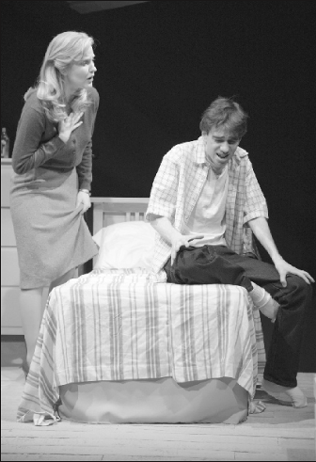By Jerry Tallmer
It was at age 16, in the summer of 1985, at a day camp on Martha’s Vineyard, that Jonathan Silverstein “just absolutely fell in love with” Robert Anderson’s “Tea and Sympathy.”
The woman who ran the Children’s Theater there had given Jonathan and a girl camper the last scene in that play to perform “as a challenge” — the last scene only, in which lonely, sensitive boarding-school teenager Tom Lee, mocked by crassmates as “a fairy” and suspect even to the school administration, is seduced, maybe not into, but toward manhood by Laura Reynolds, his dumb-ass gung-ho housemaster’s lonely, lovely, defiant wife.
Today, 22 years later, as director of the Keen Company’s well-received new look at that drama — an eyebrow-raising Broadway hit of 1953-54 starring John Kerr and Deborah Kerr, subsequently a movie starring the same duo — Jonathan Silverstein is still in love with it.
And is still boyish at 37. Beggogled, wobbly-jointed Silverstein doesn’t remember the name of the girl who played Laura on Martha’s Vineyard, just that “she was younger than me but larger than me, so that made it all right.”
The play’s famous last line, subject to considerable jest over the decades, is Laura’s, as she brings the kid’s hand to her bosom: “Years from now — when you talk about this — and you will — be kind.”
Silverstein’s kindness to “Tea and Sympathy” has been to take it at face value, which also meant overriding his first idea — “the thought of a young director, well, of an early director, a budding director, let’s say — to do it avant-garde, ironic, making fun of it.”
That would have been too easy.
“Yes,” agreed the Silverstein who two years ago had staged John Patrick’s 1945 “The Hasty Heart” for the same Keen Company, “it’s much harder to do these plays of the first half of the 20th century on their own terms, and honestly.”
The language itself — the American language — is so different, then and now. What may today seem stilted in print need not play that way.
It was Silverstein who brought the idea of “Tea and Sympathy” to Keen Company’s artistic director Carl Forsman.
Born April 28, 1969, in Providence, Rhode Island, Jonathan — whose lawyer father died of heart attack when the son was 13 — knows all about the loneliness of Tom Lee.
“I went to a prep school, the Moses Brown School in Providence — named for the Quaker brother of [Abolitionist] John Brown — that was much like the school in the play, except that it also had girls. A very sports-headed school. And the sports people were the popularity people. But I didn’t do sports. I did a lot of theater.
“Robert Anderson was writing in a very different time for gays and lesbians. I don’t think he wrote it as a treatise on homosexuality. I think he was interested in What is a man? What is masculinity? And the father / son relationship.”
(That gung-ho housemaster, Laura’s husband Bill Reynolds, comes down pretty hard on the kid, as does the kid’s own old-grad father. A perhaps predicable moment late in the play is muscular Bill Reynolds being shaken to his roots by his wife’s inquiry: “Did it ever occur to you that you persecute in Tom … the thing you fear in yourself?”)
“What’s always drawn me,” said Silverstein, “is the idea of the outsider. And in this play, not just Tom but Laura. What it means to be an outsider. What it means to be different. Many people don’t want to be an outsider.”
Mr. Silverstein, are you now or have you ever been an outsider?
“Oh my God yes. I’ve always felt that way. Was the youngest of three brothers. Both the others were very athletic. I never was. They were in the popular group. I never was. Today we’re very good friends. They’re both married and I’m gay, but I think I’m their confidant.”
You didn’t have a Laura?
Silverstein shoots his eyebrows, a la Groucho Marx. “No — but I wasn’t straight, like Tom is. I was taunted and teased at school, but not as much as Tom. In the 6th grade a kid called me Elvis, for Elvis Costello, because of my horn-rims. But certainly when I was growing up, no one thought I was gay.
“You know, this play was written in the McCarthy era. I think a lot of it still resonates. The McCarthy thing is still relevant. Homophobia is in no way dead in this country. It’s fascinating how the audience now reacts — quieter than you might think. People are shocked by the language of the bullies, and [in an opposite way] by the revelation of the husband’s fear.”
The cast at the Clurman on Theater Row is headed by Heidi Armbruster as Laura, Dan McCabe as Tom Lee. Tom’s father, Herb Lee, is played by Don Cordle. Craig Mathers is Bill Reynolds, Brandon Espinoza is Tom’s roommate Al.
Any special problems in casting?
“Yes, I was really concerned that the husband and the boy’s father not be villains. I wanted them to be non-typical non-clichés. A lot of actors came in and did that thing that sentimentalizes the material — and it was just deadly.”
So: sympathy without sentimentality. Tea with lemon but no sugar.
TEA AND SYMPATHY. By Robert Anderson. Directed by Jonathan Silverstein. A Keen Company production through April 14 at the Harold Clurman Theater, 410 West 42nd Street, (212) 279-4200.




































